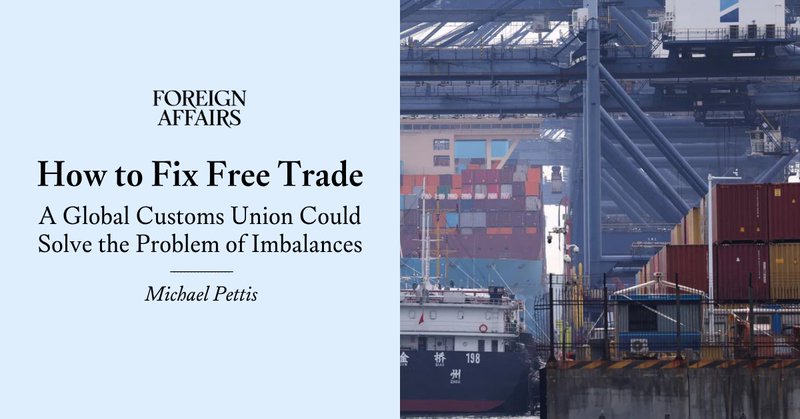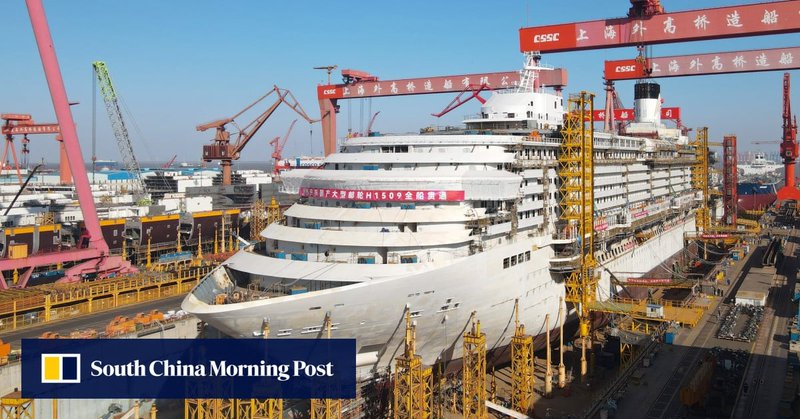
Michael Pettis
@michaelxpettis
Followers
182K
Following
11K
Media
565
Statuses
33K
Senior Fellow, Carnegie Endowment. For speaking engagements, please contact me at [email protected]
Beijing
Joined October 2017
“Debates over ‘free trade’ cannot be separated from questions of sovereignty,” argues @michaelxpettis. “To sustain a stable and fair global system, policymakers must recognize that integration entails shared constraints.” https://t.co/5DoO8wKDQv
foreignaffairs.com
A global customs union could solve the problem of imbalances.
0
9
39
2/2 To give some context, manufacturing is about 16-17% of global GDP, and about 25-26% of China's GDP. While China accounts for roughly 17-18% of global GDP, it accounts for 13% of global consumption and 31% of global manufacturing. https://t.co/4bvMdBDu3D
theglobaleconomy.com
China: Value added by the manufacturing sector as percent of GDP: The latest value from 2024 is 24.87 percent, a decline from 25.5 percent in 2023. In comparison, the world average is 12.37 percent,...
2
10
65
1/2 SCMP: "Shanghai is set to double down on efforts to prevent the “hollowing out” of its manufacturing sector even as it pursues global financial centre status." It plans to raise the manufacturing share of its GDP from 20% to 25% in the next five years. https://t.co/ksFUCAww5t
scmp.com
City’s next five-year plan expected to contain measures designed to lift manufacturing’s share of GDP to no less than 25 per cent.
4
28
133
This is an insightful way of putting it that hadn't occurred to me before. Economists who think in terms of internally consistent models have a very different way of understanding the economy from those who think more systemically, in terms of balance sheets. I'd add that
@scientificecon @ProfSteveKeen What Steve Keen and Richard Werner are showing, in different ways, is that the real fault line in economics is not “Keynes vs. Monetarists” but models vs. balance sheets. Once you enforce double-entry bookkeeping, three things become painfully clear: 1. Most textbook
16
62
310
10/10 But this cannot be true. Any change in a country's external account must be matched by a change in its domestic account. When foreigners export excess saving to the US, the US domestic imbalance must adjust one way or another. It is easy, but wrong, to pretend it doesn't.
5
8
60
9/10 Simply assuming foreign inflows finance the fiscal deficit is a mistake that comes from thinking incrementally about the economy rather than systemically, or in terms of balance sheets. It implicitly assumes that domestic debt is independent of the external account.
1
4
40
8/10 deficits (they have higher government debt-to-GDP ratios than the US) while they were exporting capital, not importing it, and countries in Europe have managed to run larger fiscal deficits than the US without the "benefits" of a global reserve currency.
1
2
36
7/10 The idea that it is foreign inflows associated with the reserve status of the dollar that "allow" the US to run such large fiscal deficits makes especially little sense in the context of foreign countries. Japan and China, for example, have run up far greater fiscal...
3
2
30
6/10 weak demand, not scarce capital – the higher saving of the rich, like foreign export of excess saving into the US, is likely to lead to more household or fiscal debt. This is what Atif Mian, Ludwig Straub, Amir Sufi found in an important recent paper. https://t.co/4USdvWKgjA
1
5
42
5/10 In fact net inflows have the same impact on US debt as rising income inequality. When income is more concentrated, the saving of the rich rises (the rich save more of their income that the poor), but because this doesn't lead to more investment – which is constrained by...
1
2
34
4/10 As I explain elsewhere, it isn't a rise in investment (the default assumption of most economists), and because a rise in unemployment is likely to set off monetary easing or fiscal expansion, the inflows are most likely to increase domestic US debt. https://t.co/w8lVduitwV
carnegieendowment.org
Contrary to conventional thinking, net foreign capital inflows do not lower American interest rates (unless they do so by raising U.S. unemployment). A tax on foreign inflows is therefore unlikely to...
1
3
38
3/10 For those who understand accounting identities, these are the three main ways foreign inflows can result in wider gap between investment and saving. When there is an increase in net foreign inflows, in other words, one (or some combination) of these must occur.
1
1
35
2/10 While this is widely believed, it isn't true. Foreign capital inflows don't fund fiscal deficits. They fund current account deficits, and they must be matched domestically either by higher US investment, higher US unemployment, or higher US household and fiscal debt.
2
12
62
1/10 WSJ: "What saves American finance is the dollar’s status as the must-have global asset and trading currency. Both roles face challenges, though, and the more the U.S. exploits foreigners, the higher the risk they look elsewhere." https://t.co/o3MJ4rpp4P via @WSJ
wsj.com
Politics and debt don’t mix well. Americans would be wise to look across the Atlantic to see how tough things can get.
3
47
210
According to my numbers consumption contributed 83% of China's GDP growth in 2023, but that was an exceptional year, and it was a partial rebound from a terrible year in which consumption contributed only 33% of China's GDP growth. Consumption was able to contribute 71% to GDP
“A stronger renminbi would help lift consumption’s share of growth from its current level of around 53 per cent back to 2023 levels of 86 per cent by making imports cheaper and increasing household purchasing power.” Big debate on whether this is doable.
7
18
108
I would add that if Europeans collectively and independently decided that they were better off abandoning manufacturing in favor of tourism and services, then fine, they should go that route, even if I suspect that would be a mistake. But for Europe to "decide" to choose that
The Economist’s answer to the China shock: Europe should reallocate towards services. That would mean Germany, and much of the continent, end up with an economy that looks more like Britain’s. In that context, this chart on the UK's productivity by sectors is interesting.
40
137
1K
12/12 So while currency appreciation would certainly benefit the economy in the longer term, it's likely to be disruptive in the short term. Unfortunately, the longer China waits, the more dependent the economy becomes on manufacturing, and so the more disruptive the adjustment.
6
5
70
11/12 This is a good thing in the longer term and especially good for employment prospects (services tend to be more labor-intensive than manufacturing), but in the short term, as Chinese businesses begin to shift production, it could lead to layoffs and rising unemployment.
1
3
42
10/12 to buy clothing, electronic goods, and processed food but, more importantly, as Chinese incomes rise, a rising share of their consumption will be directed towards services rather than manufactured goods.
1
2
39










